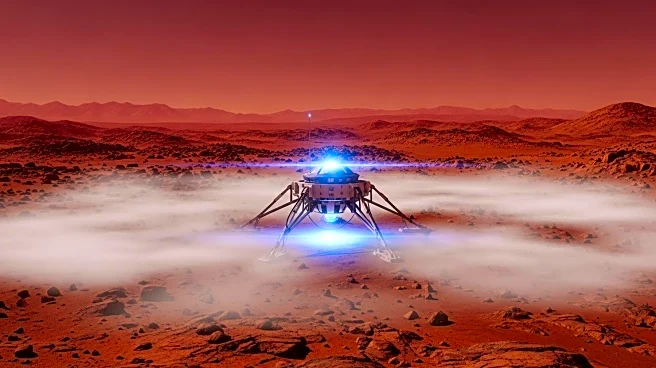What's Happening?
A team of researchers led by Dr. Erika DeBenedictis from Pioneer Labs is advocating for the serious consideration of terraforming Mars as a research program. The concept involves transforming Mars's atmosphere, temperature, and surface conditions to make it habitable for humans. Recent technological advancements, such as SpaceX's Starship and synthetic biology, have shifted the idea from impossible to very difficult. The research outlines phases of warming Mars, establishing microbial life, and eventually creating an oxygen-rich atmosphere to support complex life.
Why It's Important?
The exploration of terraforming Mars represents a significant shift in scientific thinking, moving from science fiction to a potential research agenda. This initiative could drive advancements in space technology and synthetic biology, with potential applications for Earth, such as sustainable closed-loop systems and desiccation-resistant crops. The ethical implications of altering another planet's environment are profound, raising questions about the preservation of Mars's natural history and the potential impact on any indigenous life forms. The research could also influence future space exploration policies and priorities.
What's Next?
The researchers propose a careful approach to terraforming, emphasizing laboratory studies, climate modeling, and small-scale experiments on future Mars missions. The conversation has shifted from whether terraforming is possible to whether it should be pursued and how. This could lead to increased funding and interest in space research, as well as collaborations between scientific institutions and private companies. The ethical and practical considerations will likely be central to ongoing discussions about the feasibility and desirability of terraforming Mars.
Beyond the Headlines
The potential terraforming of Mars raises broader questions about humanity's role in altering extraterrestrial environments. It challenges existing paradigms about planetary stewardship and the ethical responsibilities of space exploration. The research highlights the need for a balanced approach that considers both scientific possibilities and ethical constraints. Long-term, this could influence cultural perceptions of space exploration and humanity's place in the universe, as well as inspire new generations of scientists and explorers.









